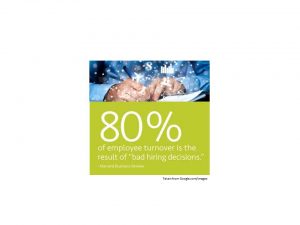 “If it weren’t for assessments, I would hire the way I always do and get the same bad results!” — President, Engineering Company
“If it weren’t for assessments, I would hire the way I always do and get the same bad results!” — President, Engineering Company
Many companies today are focused on increasing sales, saving money and improving profitability. They spend a lot of time evaluating equipment and systems to ensure the best ROI. However, they fail to take the same amount of care when selecting the right resources to hire and manage their most important asset – their employees! The result is, they miss many opportunities to hire the right people, and often lose top talent and customers due to their mistakes – costing them time, money and market share.
Cost of Poor Hiring Practices
Many executives know their turnover rate – some are proud that they are below industry standard. However, they have not quantified the financial impact to the bottom line and are in denial that they can do anything to improve it.
When you take the time required to tabulate the cost of a bad hire, promote the wrong person, or lose a talented employee, you will realize you must objectively assess potential job candidates for job fit, core values and required skills. Using qualified assessments can significantly lower theft, cost of turnover, workers’ compensation, unemployment and other employment/liability claims when used appropriately. Remember, include intangible costs such as loss of reputation, quality, customers, vendors and other important factors in your calculations, since all of these can negatively impact your bottom line.
Select Qualified Hiring Assessments
There are over 3,000 publishers of assessment products in the market. Most assessments do not comply with the Department of Labor’s guidelines for pre-employment use (See: Testing and Assessment: An Employer’s Guide to Good Practices, Department of Labor). High-quality tools will have technical manuals (not just a letter from a law firm) to ensure each assessment meets the validity and reliability specifications for pre-employment and selection purposes. Ask for the technical manual and refuse to use an assessment for pre-employment purposes without one.
Assessments with High Validity and Reliability are Incredibly Accurate
Many assessments used for training or coaching purposes will show differences in people. However, they usually do not comply with higher statistical requirements for pre-employment tools. Not only is using the right assessment of legal importance, using tools that actually have the highest validity and reliability will measure people accurately and objectively – a requirement to predict future success. The best assessments provide you the ability to become a laser-like coach. Also, due to their accuracy, you will improve your selection process and reduce costs. Remember, any tool, system or process used during the hiring or promotion process must comply with pre-employment requirements.
When you select the right qualified assessments and use them as directed, they work and will positively revive your bottom line.
©Jeannette Seibly, 2015
Source: “Hire Amazing Employees,” Chapter 11, Assess for Job Fit—Use Qualified Assessments http://BizSavvyHire.com
Jeannette Seibly has been a business advisor and facilitator for over 23 years; she guides the creation of new solutions for business challenges and is the author of Hire Amazing Employees. Check out her website: http://SeibCo.com. Or, contact Jeannette @ http://SeibCo.com/contact
